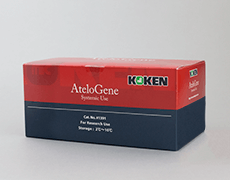Newsletters
AteloGene for decoy oligonucleotides transfection in a sepsis model
29 May 2018
In this edition of mail news, we introduce a paper that provides an example of systemic decoy oligonucleotide administration in a sepsis model using an in vivo transfection reagent called AteloGene Systemic Use.
Systemic administration of decoy oligonucleotides in a sepsis mouse model
Article information
Activator Protein-1 Decoy Oligodeoxynucleotide Transfection Is Beneficial in Reducing Organ Injury and Mortality in Septic Mice.
Imaizumi T, Matsuda N, Tomita K, Palikhe S, Ohashi W, Hattori K, Hattori Y.
Crit Care Med. 2018 May;46(5):e435-e442. PMID: 29406423
Overview
Multiple organ failure caused by sepsis is a significant clinical problem with high mortality and is defined as fatal organ dysfunction due to dysregulation of a host’s response to infection.
Although the pathophysiology of sepsis has been studied over the past decades, there is still no effective treatment method.
Previous studies show that NF-κB plays an important role in the transcriptional regulation of immunoregulatory mediators that contribute to the pathology of sepsis.
Along with NF-κB, AP-1 is involved in the production of inflammatory cytokines such as TNF-α and IL-6 by LPS-induced monocytes.
Furthermore, it has been shown that NF-κB and AP-1 are activated during different times in sepsis, suggesting that AP-1 is involved in the pathology through a different pathway compared to NF-κB.
Therefore, the effects of administration of AP-1 decoy oligonucleotides on a sepsis model were evaluated in terms of the production of inflammatory cytokines, organ damage and mortality.
Following tail vein administration of the AP-1 decoy oligonucleotides using AteloGene in a mouse model of sepsis, concentration-dependent and AP-1 specific inhibitory effects were observed.
Moreover, the expression level of inflammatory cytokines such as IL-1β and TNF-α in the lungs, liver and kidney was markedly reduced compared to the control group, and the histologically evaluated damage scores of each organ were also decreased.
In addition, the expression level of apoptosis-related genes was increased in the control group, but they were shown to be inhibited in the decoy oligonucleotide administration group in which the mortality rate was also reduced.
AteloGene forms a complex with miRNA/siRNA and suppresses degradation of the miRNA/siRNA
Product Name
– AteloGene Systemic Use (Cat. No.: #1393 for Cosmo Bio customers)
(Cat. No.: #1395 for REPROCELL customers)
